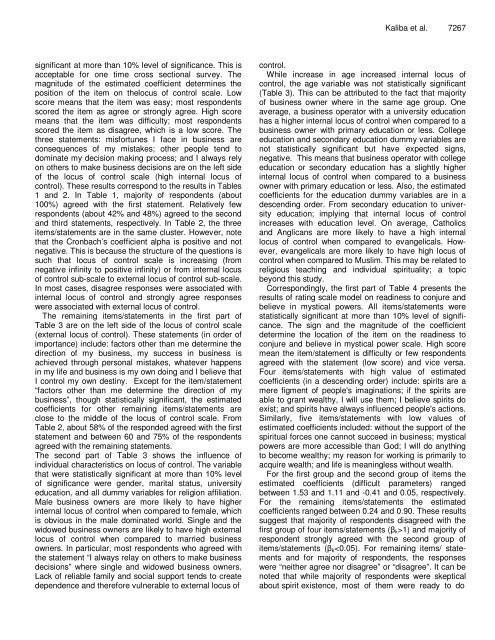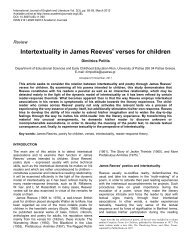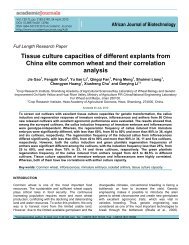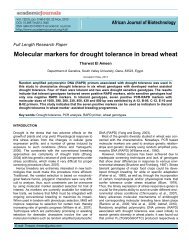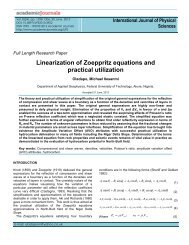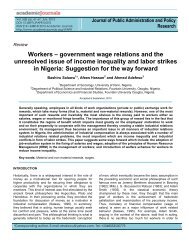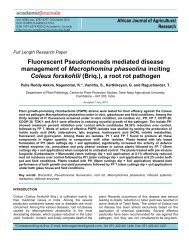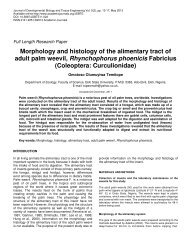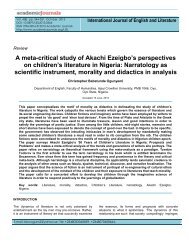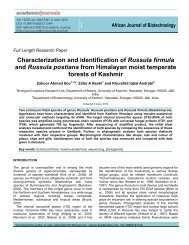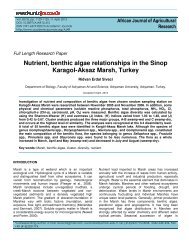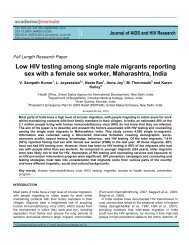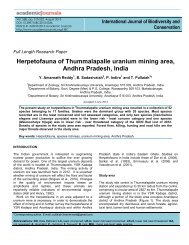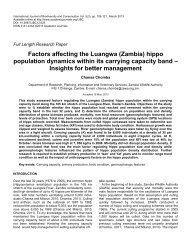Download Complete Issue (8760kb) - Academic Journals
Download Complete Issue (8760kb) - Academic Journals
Download Complete Issue (8760kb) - Academic Journals
You also want an ePaper? Increase the reach of your titles
YUMPU automatically turns print PDFs into web optimized ePapers that Google loves.
significant at more than 10% level of significance. This is<br />
acceptable for one time cross sectional survey. The<br />
magnitude of the estimated coefficient determines the<br />
position of the item on thelocus of control scale. Low<br />
score means that the item was easy; most respondents<br />
scored the item as agree or strongly agree. High score<br />
means that the item was difficulty; most respondents<br />
scored the item as disagree, which is a low score. The<br />
three statements: misfortunes I face in business are<br />
consequences of my mistakes; other people tend to<br />
dominate my decision making process; and I always rely<br />
on others to make business decisions are on the left side<br />
of the locus of control scale (high internal locus of<br />
control). These results correspond to the results in Tables<br />
1 and 2. In Table 1, majority of respondents (about<br />
100%) agreed with the first statement. Relatively few<br />
respondents (about 42% and 48%) agreed to the second<br />
and third statements, respectively. In Table 2, the three<br />
items/statements are in the same cluster. However, note<br />
that the Cronbach’s coefficient alpha is positive and not<br />
negative. This is because the structure of the questions is<br />
such that locus of control scale is increasing (from<br />
negative infinity to positive infinity) or from internal locus<br />
of control sub-scale to external locus of control sub-scale.<br />
In most cases, disagree responses were associated with<br />
internal locus of control and strongly agree responses<br />
were associated with external locus of control.<br />
The remaining items/statements in the first part of<br />
Table 3 are on the left side of the locus of control scale<br />
(external locus of control). These statements (in order of<br />
importance) include: factors other than me determine the<br />
direction of my business, my success in business is<br />
achieved through personal mistakes, whatever happens<br />
in my life and business is my own doing and I believe that<br />
I control my own destiny. Except for the item/statement<br />
“factors other than me determine the direction of my<br />
business”, though statistically significant, the estimated<br />
coefficients for other remaining items/statements are<br />
close to the middle of the locus of control scale. From<br />
Table 2, about 58% of the responded agreed with the first<br />
statement and between 60 and 75% of the respondents<br />
agreed with the remaining statements.<br />
The second part of Table 3 shows the influence of<br />
individual characteristics on locus of control. The variable<br />
that were statistically significant at more than 10% level<br />
of significance were gender, marital status, university<br />
education, and all dummy variables for religion affiliation.<br />
Male business owners are more likely to have higher<br />
internal locus of control when compared to female, which<br />
is obvious in the male dominated world. Single and the<br />
widowed business owners are likely to have high external<br />
locus of control when compared to married business<br />
owners. In particular, most respondents who agreed with<br />
the statement “I always relay on others to make business<br />
decisions” where single and widowed business owners.<br />
Lack of reliable family and social support tends to create<br />
dependence and therefore vulnerable to external locus of<br />
Kaliba et al. 7267<br />
control.<br />
While increase in age increased internal locus of<br />
control, the age variable was not statistically significant<br />
(Table 3). This can be attributed to the fact that majority<br />
of business owner where in the same age group. One<br />
average, a business operator with a university education<br />
has a higher internal locus of control when compared to a<br />
business owner with primary education or less. College<br />
education and secondary education dummy variables are<br />
not statistically significant but have expected signs,<br />
negative. This means that business operator with college<br />
education or secondary education has a slightly higher<br />
internal locus of control when compared to a business<br />
owner with primary education or less. Also, the estimated<br />
coefficients for the education dummy variables are in a<br />
descending order. From secondary education to university<br />
education; implying that internal locus of control<br />
increases with education level. On average, Catholics<br />
and Anglicans are more likely to have a high internal<br />
locus of control when compared to evangelicals. However,<br />
evangelicals are more likely to have high locus of<br />
control when compared to Muslim. This may be related to<br />
religious teaching and individual spirituality; a topic<br />
beyond this study.<br />
Correspondingly, the first part of Table 4 presents the<br />
results of rating scale model on readiness to conjure and<br />
believe in mystical powers. All items/statements were<br />
statistically significant at more than 10% level of significance.<br />
The sign and the magnitude of the coefficient<br />
determine the location of the item on the readiness to<br />
conjure and believe in mystical power scale. High score<br />
mean the item/statement is difficulty or few respondents<br />
agreed with the statement (low score) and vice versa.<br />
Four items/statements with high value of estimated<br />
coefficients (in a descending order) include: spirits are a<br />
mere figment of people's imaginations; if the spirits are<br />
able to grant wealthy, I will use them; I believe spirits do<br />
exist; and spirits have always influenced people's actions.<br />
Similarly, five items/statements with low values of<br />
estimated coefficients included: without the support of the<br />
spiritual forces one cannot succeed in business; mystical<br />
powers are more accessible than God; I will do anything<br />
to become wealthy; my reason for working is primarily to<br />
acquire wealth; and life is meaningless without wealth.<br />
For the first group and the second group of items the<br />
estimated coefficients (difficult parameters) ranged<br />
between 1.53 and 1.11 and -0.41 and 0.05, respectively.<br />
For the remaining items/statements the estimated<br />
coefficients ranged between 0.24 and 0.90. These results<br />
suggest that majority of respondents disagreed with the<br />
first group of four items/statements (βk>1) and majority of<br />
respondent strongly agreed with the second group of<br />
items/statements (βk


